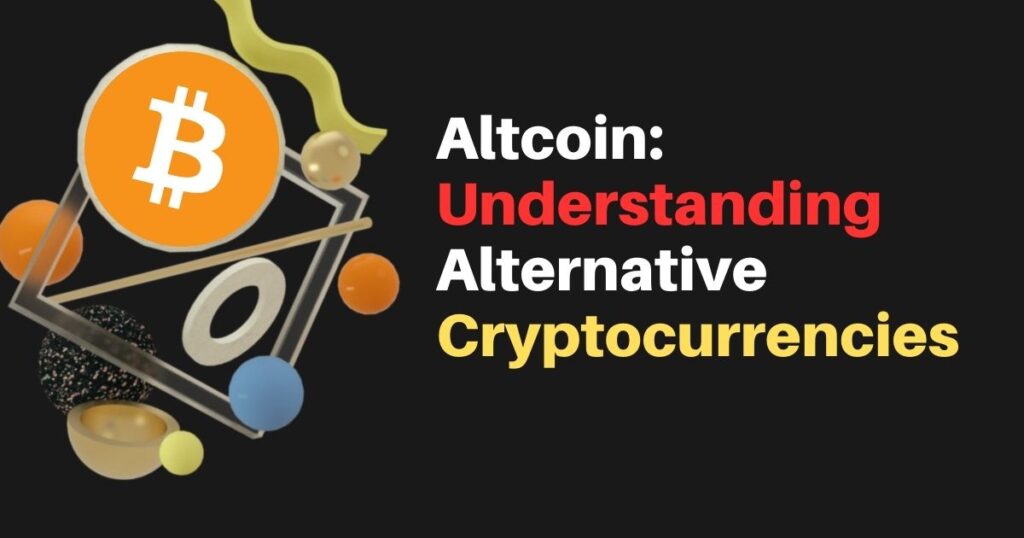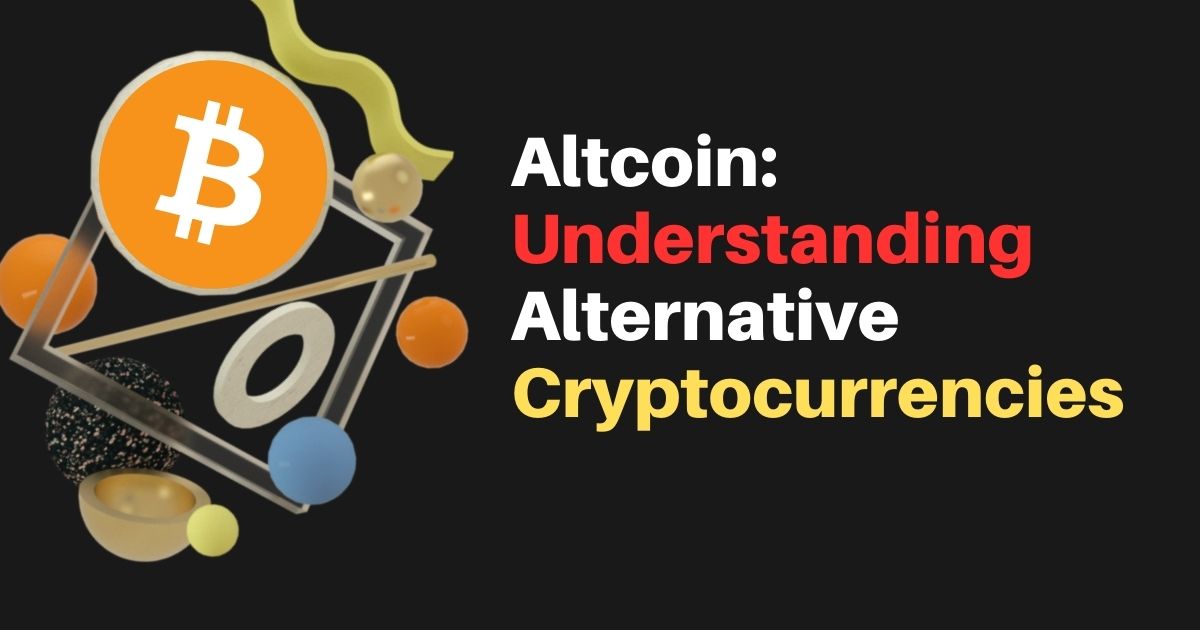Since the launch of Bitcoin in 2009, cryptocurrency has come a long way. Today, thousands of alternative cryptocurrencies offer many features and use cases similar to Bitcoin. In this article, we explore what an altcoin is, how it works, and its potential impact on the financial world.

What is Altcoin?
Altcoin is used to describe any cryptocurrency other than Bitcoin. These alternative cryptocurrencies are created to improve on the original cryptocurrencies, offering new features and advantages that Bitcoin lacks. The most notable feature of altcoins is that they use blockchain technology, a decentralized, secure, and transparent ledger that records all transactions like bitcoin.
A brief history of Altcoin
The history of the altcoin started form 2011 with the introduction of the first altcoin Namecoin. It is used for the registration of domain names. It was also a blockchain-based decentralized ledger.
After the launch of Namecoin, many alternative coins come into effect. Each coin was offering unique features and use cases. Some of the coins give fast transaction time and low fees compared to bitcoin. Some of the offering cross border transactions.
Purpose of Altcoin
Altcoins are used for various purposes. Altcoin’s purpose depends on the type of coin and how users use them. Altcoins are created to overcome the limitation of bitcoin. Different altcoins provide different features and promote innovation.
Characteristics of Altcoin or Differences from Bitcoin
Altcoins, or alternative cryptocurrencies, can have a wide range of characteristics, as there are many different types and variations of altcoins. However, here are some common characteristics that many altcoins share:
Different mining algorithms: Altcoins often use different mining algorithms than Bitcoin, such as Scrypt, X11, or Ethash. This can make them easier or harder to mine than Bitcoin, and can also affect their security and decentralization.
Different transaction speeds and fees: Altcoins can have different transaction speeds and fees than Bitcoin, which can make them more or less suitable for certain use cases.
Different consensus mechanisms: Altcoins can use different consensus mechanisms than Bitcoin, such as Proof of Stake or Delegated Proof of Stake. These mechanisms determine how new blocks are added to the blockchain and how the network reaches consensus.
Different features and use cases: Altcoins can be designed to offer different features and benefits than Bitcoin, such as improved privacy, programmability, or scalability. This can make them more suitable for certain use cases or applications.
Different communities and development teams: Altcoins often have their own communities and development teams, which can be more or less active and involved than Bitcoin’s community and development team.
Different market capitalization and liquidity: Altcoins can have different market capitalizations and levels of liquidity than Bitcoin, which can affect their price stability and volatility.
Overall, the characteristics of altcoins can vary widely depending on their design, use case, and community.
Types of Altcoins
Privacy coins: Privacy coins are cryptocurrencies that are designed to offer enhanced privacy and anonymity features compared to other cryptocurrencies. Some examples of privacy coins include Monero (XMR), Zcash (ZEC), and Dash (DASH).
Stablecoins: Stablecoins are cryptocurrencies that are designed to maintain a stable value relative to a particular asset or currency, such as the US dollar or gold. This can make them useful for applications such as trading, remittances, and payments, as they offer a more stable value than other cryptocurrencies that can be subject to price volatility. Some examples of stablecoins include Tether (USDT), USD Coin (USDC), and Dai (DAI).
Security tokens: Security tokens are cryptocurrencies that represent ownership in a real-world asset, such as stocks, bonds, or real estate. They are designed to offer greater transparency, liquidity, and accessibility compared to traditional securities, as they can be traded on decentralized exchanges and offer fractional ownership. However, security tokens are subject to regulatory oversight and must comply with securities laws in the jurisdictions in which they are traded. Some examples of security tokens include Polymath (POLY) and Harbor (HBR).
Pros and Cons of Altcoin
Pros of altcoin
Altcoin come up with Increased privacy
Faster transactions
Lower fees
Promote Innovation
Variety of altcoins available in the market.
Cons of Altcoin
Low volatility and less liquid than Bitcoin.
Lack of regulation
Fear of risk and scams
Difficult to choose an altcoin.
Investment in Altcoin
Investing in altcoins can be a lucrative opportunity for investors, but it also carries significant risks. Here are some things to consider before investing in altcoins:
Research: Before investing in any altcoin, it is important to conduct thorough research and due diligence. This includes understanding the altcoin’s technology, team, community, and potential use cases.
Diversification: It is important to diversify your investment portfolio to reduce risk. Investing in multiple altcoins can help to spread your risk and increase your chances of generating a return.
Market volatility: The cryptocurrency market is highly volatile and can experience significant price swings in a short period. It is important to be prepared for these fluctuations and invest only what you can afford to lose.
Security: Cryptocurrencies are stored in digital wallets, which can be vulnerable to cyber-attacks. It is important to choose a reputable wallet provider and take steps to secure your funds, such as enabling two-factor authentication and keeping your private keys safe.
Liquidity: Some altcoins may have lower trading volumes and liquidity compared to more established cryptocurrencies like Bitcoin and Ethereum. This can make it difficult to buy or sell large amounts of the altcoin at once and may impact the price of the coin.
Overall, investing in altcoins can be a high-risk, high-reward opportunity. It is important to approach it with caution, conduct thorough research, and only invest what you can afford to lose.
Most Popular Altcoin
Each with its own unique characteristics and use cases. Here are some of the most common types of altcoins:
Litecoin (LTC): Litecoin is a peer-to-peer cryptocurrency that uses a Scrypt mining algorithm, which is designed to be more memory-intensive than Bitcoin’s mining algorithm. This makes it easier to mine Litecoin with consumer-grade hardware and reduces the risk of centralization by large mining pools.
Ethereum (ETH): Ethereum is a decentralized platform that allows developers to build and deploy decentralized applications (dApps) on top of its blockchain. It uses a different consensus mechanism than Bitcoin called Proof of Stake, which allows it to process transactions more quickly and with lower fees than Bitcoin.
Ripple (XRP): Ripple is a digital currency that is designed to facilitate cross-border payments and money transfers. It uses a different consensus mechanism than Bitcoin called Ripple Protocol Consensus Algorithm (RPCA), which allows it to process transactions more quickly and with lower fees than Bitcoin.
Bitcoin Cash (BCH): Bitcoin Cash is a fork of Bitcoin that was created in 2017 to address Bitcoin’s scalability issues. It has a larger block size limit than Bitcoin, which allows it to process more transactions per second and with lower fees.
Monero (XMR): Monero is a privacy-focused cryptocurrency that uses a different mining algorithm than Bitcoin called CryptoNight. This algorithm is designed to be ASIC-resistant, which means that it can be mined with consumer-grade hardware and reduces the risk of centralization by large mining pools.
Zcash (ZEC): Zcash is a privacy-focused cryptocurrency that uses a different cryptographic protocol than Bitcoin called zk-SNARKS. This protocol allows users to make private transactions that are shielded from public view.
These are just a few examples of the many different types of altcoins that are available. Other types of altcoins include utility tokens, security tokens, stablecoins, and many others.
Conclusion
In conclusion, altcoins offer a diverse range of options for individuals and businesses looking to invest in digital currencies beyond Bitcoin. Altcoins are based on the same basic principles as Bitcoin but differ in terms of their specific features, algorithms, and target markets. They can increase privacy and anonymity through the use of advanced encryption techniques, privacy-focused algorithms, and decentralized data storage. However, investing in altcoins comes with significant risks, including market volatility, low liquidity, and cyber security threats. Therefore, investors need to conduct thorough research, diversify their investment portfolios, and only invest what they can afford to lose. Despite the risks, altcoins continue to offer an exciting and innovative opportunity for those looking to participate in the cryptocurrency market.
FAQs
What is an altcoin and how does it differ from Bitcoin?
Altcoin is a digital currency that is an alternative to Bitcoin, based on the same principles but with different features, algorithms, and target markets.
What are the different types of altcoins?
There are many different types of altcoins, including privacy-focused coins, gaming coins, and platform coins.
How do you buy and sell altcoins?
Altcoins can be bought and sold on cryptocurrency exchanges, which allow users to trade them for other cryptocurrencies or fiat currencies.
Are altcoins a good investment opportunity?
Altcoins can offer a good investment opportunity, but they also carry significant risks due to market volatility, low liquidity, and cyber security threats.
What are the risks involved in investing in altcoins?
The risks involved in investing in altcoins include market volatility, low liquidity, cyber security threats, and regulatory risks.
How does the technology behind altcoin work?
The technology behind altcoin works through the use of advanced encryption techniques, privacy-focused algorithms, and decentralized data storage.
What are the future of altcoin and its impact on the financial world?
The future of altcoin is uncertain, but it has the potential to disrupt the financial world by offering new ways to transact and store value.
How do you store altcoins safely?
Altcoins can be stored safely in digital wallets, which are secure software applications that allow users to store, manage, and transfer their altcoins.
What is mining in the context of altcoin?
Mining in the context of altcoin involves solving complex mathematical algorithms using specialized hardware to generate new units of the currency.
How do you choose the best altcoin to invest in?
Choosing the best altcoin to invest in involves conducting thorough research and due diligence to understand the altcoin’s technology, team, community, and potential use cases.




